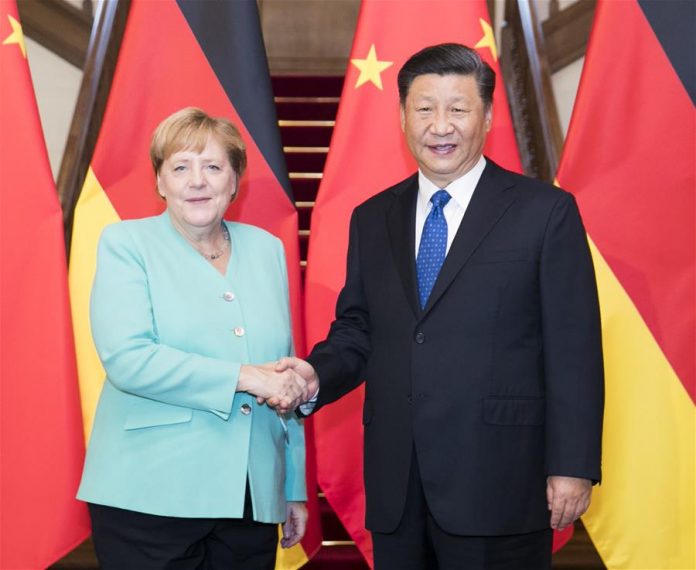German Chancellor Angela Merkel might be one of the very few western leaders who can sit with her Chinese counterparts peacefully discussing freedom values without inviting scathing criticism or economic punishment on German businesses. In the past three months, when the U.S. or U.K. urged China to respect freedom values in Hong Kong, China fiercely pushed back, accusing them of interfering in internal affairs. However, when Merkel was in Beijing talking about recent Hong Kong protest and pressing for peaceful resolution and guarantee of freedom values in Hong Kong, China tolerated it with Premier Li Keqiang mildly reiterating China’s stance.
The sharp contrast may provoke political observers to ask why Angela Merkel can avoid China’s accusation even when she touches upon taboo issues for Chinese leadership like human rights and liberal values in their meeting. Some may contend that the deepening of economic and trade cooperation between two countries may, to some extent, become a deterrent that prevents China from incriminating Germany for discussing sensitive topics in Beijing.
Of course, the bilateral trade relation is a primary factor in play. Amid escalated and prolonged trade war with the U.S., China urgently needs to team up with other economies to fight against American’s unilateral trade protectionism. As the European Union also suffers tariff from its traditional partner across the Atlantic and falls victim to trade protectionism, it shares the destiny with China in this regard. It’s natural that the Chinese leadership may consider pulling the EU to its side. Specifically, China needs investment from Europe to make up for the loss from the prospective exit of American companies pressured by U.S. President Donald Trump. Meanwhile, as the largest economy in the EU, Germany is facing a growing risk of economic slowdown with falling quarterly economic output, and thus is also in need of Chinese investment. Therefore, both sides may hope that such symbiotic relation won’t be disrupted and derailed by differences over Hong Kong issue.
However, beyond intertwined economy and trade relations, other factors may contribute to China’s mildness and tolerance. One of them might be that China understands Merkel’s rhetoric never bites. Although Merkel brought a large business delegation to China, she has been under mounting pressure from and is highly-anticipated in the liberal world to mention Hong Kong to Chinese leadership. China knows well the dilemma of the Chancellor. More importantly, as Merkel’s rhetoric only stays at rhetoric level and won’t translate into concrete threatening behaviors, it might be a sound tactic to let her finish a routine task expected by the liberals for each of her China trips. Since business-comes-first approach has become an implied consensus for both parties, staying soft and tolerant may create a better atmosphere in business negotiation.
Furthermore, it’s the economic mutual dependence between China and Germany that might put Merkel at odds with not only EU’s broader push for a “tougher and united” position against China, but also with her own evaluation that “we (and China) are not just partners, but also competitors”. While French President Emmanuel Macron declared the end of “European naïveté” towards China and EU report considered China as “systematic rival” and “strategic competitor”, Merkel’s signaling of closer economic ties and apparent covert understanding with China on freedom values may sow the seed of division within the EU, which might play into China’s hands.
In conclusion, given the current bilateral economic ties, it’s difficult for Merkel to do something beyond words and urges on Hong Kong issue or other human rights issues, and equally difficult for China to react angrily to Merkel’s rhetoric on these topics. Ultimately, compared to President Trump’s saying-little-but-doing-something approach on human rights, Merkel’s words-instead-of-deeds style may be more innocuous and thus more acceptable to the Chinese leadership.
The views and opinions expressed in this article are those of the author and do not necessarily reflect the official policy or position of The Geopolitics.

Keyu Chen served as financial translator for Goldman Sachs, J.P. Morgan and Deutsche Bank. He holds M.A. in international journalism and communication from Beijing Foreign Studies University. He’s interested in political communication, comparative politics and international relations.


